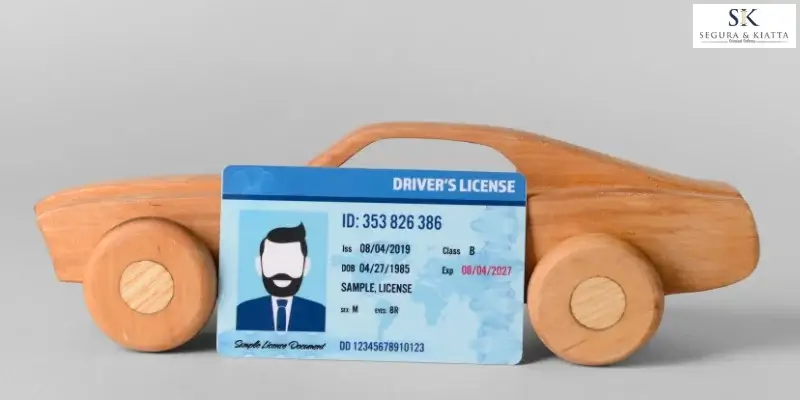|
|
Last Modified on Jun 05, 2025
Driving while intoxicated offenses lead to very stressful criminal charges. However, they also have potentially significant administrative penalties, which can affect your license. If you find yourself in this situation, you may be asking, “What happens to your driver’s license after a DWI arrest in Texas?”
Know that what you do during an arrest can directly impact your ability to drive, and what you must do soon after an arrest can protect your driving privileges.
Implied Consent Laws and License Suspension
In Texas, you have given implied consent to a blood or breath test by having a driver’s license in the state. This does not apply to field sobriety tests; however, if you fail these field tests, you may be arrested, at which point chemical tests will be administered.
The process of license suspension can differ significantly, depending on whether you take the blood or breath test when you are pulled over by a police officer.
- Refusing a chemical test. If you refuse the blood or breath chemical test when it is asked of you, your license will be suspended, and it will go into effect soon after the notice if you do nothing to contest it. The length of this suspension can be either 180 days or two years, depending on whether you have prior DWI convictions.
- Consenting to the chemical test. If you take the blood or breath test, your license will not be immediately suspended. However, it may be suspended later, depending on the results of the test and what steps you take next.
In 2023, Texas saw 84,962 reported DUIs. This indicates the seriousness with which these offenses are taken in the state.
Administrative License Revocation Hearing
An Administrative License Revocation (ALR) hearing is necessary to potentially prevent the suspension of your license or have it reinstated after an arrest for a DWI. This procedure is separate from a criminal case, but it is also important. The ALR hearing is the process for suspending your license if:
- Your blood alcohol concentration (BAC) was over the legal limit.
- You would not take the blood or breath chemical test.
If you refuse the chemical test, you will be immediately given a notice of the suspension of your license, and you have to seek an ALR hearing within 15 days to contest the suspension. If you fail to request the hearing, the suspension will go into effect 40 days after the arrest.
If you took the chemical test, you would only receive a suspension notice if the results of the test show that your BAC was over the legal limit. You have 20 days after receiving the suspension notice to ask for an ALR hearing. If you don’t, the suspension goes into effect 40 days after confirming that you received the notice of suspension.
How Long Is the Suspension For?
The timeframe of your license suspension depends on how many prior DWI offenses you have, whether you are under 21, and whether anyone was hurt in the offense. It can be as few as 60 days for under-21 offenders or as many as 90 days for over-21 offenders with a first offense. It can also be as long as a two-year suspension for habitual offenders.
How Can You Reinstate Your License?
To reinstate your license after a DWI conviction, you must follow the requirements stated by the court, which could include:
- Serve the driver’s license suspension period, which could range from 90 days to two years.
- Pay the reinstatement fee, which may be between $100 and $125, depending on whether the reinstatement occurred due to an ALR hearing.
- Pay other outstanding fees.
- Complete any criminal sentence, including jail, prison, probation, or other alternative sentencing.
- Complete the DWI intervention or repeat offender program for the required number of hours.
- Provide proof of SR-22 insurance from an approved insurer, and maintain the coverage for a minimum of two years.
- Install an ignition interlock device, and pay the fees for it.
Depending on the offense and result of an ALR hearing, not all these steps may be required. An experienced DWI attorney can determine what you must do to reinstate your license.
FAQs
Q: Is Your License Immediately Suspended After a DWI in Texas?
A: Your driver’s license is not immediately suspended after a DWI in Texas unless you refuse to take the blood or breath test. When you do take the blood or breath test, your license will not be suspended until the Department of Public Safety processes the test results. You will receive a notice of suspension, and then you have 20 days to request an administrative hearing. Depending on the outcome of this hearing, your license may or may not be suspended.
Q: How Do I Get My License Back After a DWI in Texas?
A: There are numerous requirements to get your license back in Texas after a DWI conviction. You must pay a reinstatement fee of $100 unless you are reinstating your license after an administrative hearing. In that case, the fee is $125. This fee will only reinstate your license after the required suspension period. You must also provide proof of the required insurance and that you took any court-ordered driving or treatment course.
Q: What Is the Penalty for a First-Time DWI in Texas?
A: The penalty for a first-time DWI in Texas is a Class B misdemeanor. It includes the following penalties:
- Up to $2,000 in fines
- A mandatory minimum sentence of 72 hours in jail
- Up to 180 days in jail
- License suspension for up to two years
Aggravating factors can worsen the penalties, such as intoxicated driving with a child passenger or causing an accident that leads to serious bodily injury to another person.
Q: What Is the New Law for a DWI in Texas?
A: The most recent significant change to DWI laws in Texas was the passing of Bentley’s Law in 2023, which requires impaired drivers to pay child support when their impairment causes an accident that leads to the death of a child’s parent. This civil restitution is on top of the criminal penalties and fines for the offense. Other than this law, there have not been any recent changes to Texas DWI laws.
Protect Your Future
Intoxicated drivers are taken very seriously by law enforcement and prosecutors, so they can be penalized harshly. It’s crucial that you take steps to protect yourself. Just because you have been arrested for a DWI does not mean you will be convicted. At Segura & Kiatta, we can address your DWI charges, along with both criminal and administrative penalties. Contact our firm to see how we could advocate for your interests and potentially mitigate these penalties.




